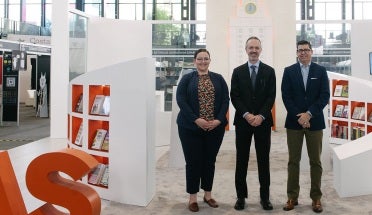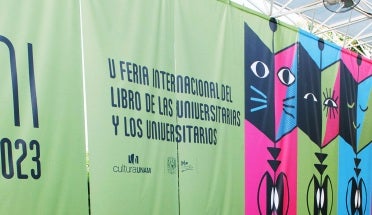
Grant from LLILAS Funds Ecology and Culture Seminar in Xalapa, Mexico
- May 22, 2024
- Mexico Global Gateway
- by Gwendolyn Reed
A four-day symposium took place recently in Xalapa, Mexico, focusing on the interrelationship between ecology and culture in the country’s vibrant Huasteca region, thanks to a $10,000 grant from the Teresa Lozano Long Institute of Latin American Studies (LLILAS) at The University of Texas at Austin.
Throughout the Seminar on Ecocultural Knowledge of the Huasteca, which occurred May 8-12, participants from UT Austin as well as Mexico-based scholars and practitioners engaged in multidisciplinary workshops that explored language, music, foodways, handcrafts, spirituality and more, all emanating from the culturally rich and specific Huasteca region.
The UT organizers of the project are Robin Moore, professor of ethnomusicology, and graduate student JA Strub, both at the Butler School of Music. Moore is a national expert on higher-education curriculum reform and an advocate for interdisciplinary approaches to music studies. He also has an extensive track record of promoting intercultural and transnational research initiatives.
Strub is a graduate student in ethnomusicology and an advisee of Moore whose studies center around the music of the Huasteca region. A current resident of Xalapa, he is studying the Nahuatl language with the support of a Foreign Language and Area Studies grant.
A Cultural Epicenter
Like Austin, Xalapa is the capital of its state (Veracruz) and the site of a large public university, the Universidad Veracruzana. Although not located in the Huasteca region proper, Xalapa’s status as a scholastic and creative epicenter has attracted a large diaspora of Huasteco intellectuals to the city. Wedged between the Sierra Madre Oriental and the Gulf Coast, Xalapa’s diverse ecology — which ranges from cool cloud forest to tropical flood plain — renders it a region of bioecological interest and affects the culture of its residents in vivid ways.
The idea for the encuentro developed out of Strub’s dissertation fieldwork. While living and working in Xalapa, he became enthralled with the city’s vibrant academic and artistic scene, as well as the surrounding natural environment. And compared to other areas of Mexico, the Huasteca region has been minimally studied by U.S. scholars. Strub pitched this project in hopes of connecting UT and LLILAS to local residents, including students and researchers at the Universidad Veracruzana and members of Xalapa’s large Huasteco diaspora.
The goal of the encuentro, Moore said, was to “raise awareness about the significance of the Huasteca as a potential research site for UT students and faculty and to help establish longer-term academic dialogues that will benefit multiple institutions.”

The event did just that, with each day offering a myriad of opportunities for cultural and academic enrichment. UT students and faculty were able to experience all that Xalapa has to offer through each presentation, workshop, celebration or performance. While facilitating the experience, Strub and Dr. Moore learned alongside participants.
“Personally, I knew relatively little about the strong Indigenous cultural presence in the area and the way it affects virtually all aspects of society,” Moore said. “I will definitely think and teach about the region differently going forward.”
Immersive Learning Experiences
Presenters designed their unique workshops to incorporate interactivity, creativity and play as part of an immersive experience. Workshops and evening events took place at the Centro Recreativo de Xalapa and the historic neighborhood of Xalitic. Early on, participants attended a reception at the Museum of Anthropology followed by dinner and a performance by the Nahuatl-speaking Trio Atardecer Huasteco.
Educational presentations and hands-on workshops throughout the five-day event centered around music, dance, instrument building, gastronomy, ecological knowledge and more. One workshop featured experts in six languages of the Huasteca (Mexican Spanish, Nahuatl, Tének, Otomí, Tepehua, and Totonaco) and provided insight on the ways in which language shapes the relationship between humankind and nature.

Each day of the seminar concluded with a musical performance by a trio Huasteco, during which participants had the opportunity to learn how to play, sing and dance alongside renowned performers. The selected trios were proficient not only in Spanish but also in regional Indigenous languages, making them a prominent component of the encuentro’s language revitalization efforts.
A Monumental Opportunity
LLILAS provides funding opportunities to students and faculty hoping to conduct field research in Latin America and the Caribbean. Their grants equip recipients to produce thoroughly developed projects that present as strong candidates for future external funding. Through detailed proposals outlining their impassioned objectives, Strub and Moore secured a Community Engagement Seed Grant, and the funds allowed them to bring the Xalapa Encuentro vision to life.
Benjamin Ibarra-Sevilla, professor of architecture and LLILAS associate director of research initiatives, said that LLILAS leadership saw the Xalapa Encuentro as a “monumental opportunity.”
“This seminar showcases our commitment to integrating ecological and cultural perspectives, and positions us as leaders in promoting sustainable and inclusive educational practices,” Ibarra-Sevilla said. “Collaborating with scholars and practitioners from Mexico expands our academic and cultural horizons, creating a framework for new knowledge that benefits our academic community and global understanding.”
Long-lasting Outcomes
On the final day, the seminar closed with a major Huasteca culture festival. The daylong festivities attracted an audience of thousands and featured food, arts, crafts and hours of music and dance.
The multifaceted series of events highlighted collaborations with many local organizations — arrangements that were not only integral to the orchestration and execution of the event but also financially advantageous for the Xalapa community.
Moore and Strub envision numerous benefits arising from these new relationships between Texas and scholars in the Huasteca. From the building of academic, research and faculty exchanges to the fostering of Indigenous student connections and ties with local language institutions, the promise of initiatives resulting from the Xalapa Encuentro stand to outlast the seminar itself.



